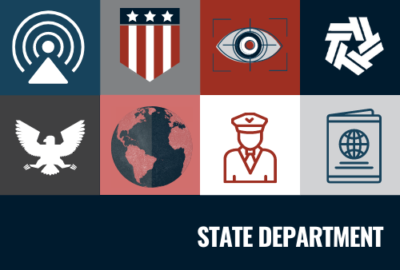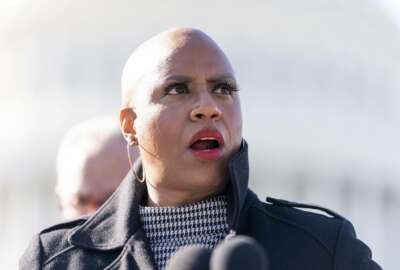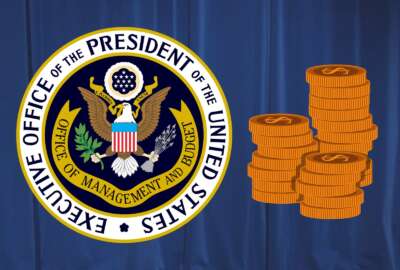Exclusive
OMB names DoD’s suicide prevention director as chief statistician to lead data goals
The Office of Management and Budget is naming Karin Orvis as its chief statistician, a position that hasn't had a permanent leader in more than two years.
The Biden administration is naming a new chief statistician to oversee its many data-led policy goals.
The Office of Management and Budget is naming Karin Orvis as the next U.S. chief statistician and branch chief for statistical and science policy at OMB’s Office of Information and Regulatory Affairs. OMB hasn’t had a permanent official to lead these efforts in more than two years.
Orvis, prior to joining OMB, served as the director of the Defense Suicide Prevention Office, which leads suicide prevention programs across the Defense Department.
Orvis said she’s “committed to ensuring the quality, integrity, and objectivity of federal statistics and information used in decision-making across the public and private sectors.”
“I look forward to working with the leaders of the federal statistical system, including the Interagency Council on Statistical Policy, as well as other key stakeholders in both the public and private sector,” Orvis said.
As chief statistician, Orvis will oversee a decentralized network of federal statistical agencies, as well as lead efforts to provide statistical data, which serves as the basis for major policy decisions in and out of government.
Orvis will also serve on the administration’s Equitable Data Working Group, which issued a report last week directing agencies on how to promote equity in federal data.
Orvis, earlier in her federal career, served as DoD’s acting principal director of military community and family policy, a role that oversees military quality of life programs for service members and their families.
She also served as the director of DoD’s Transition to Veterans Program Office, which ensures service members are prepared for the adjustment from active duty to civilian life.
OMB Director Shalanda Young said Orvis brings a depth of experience to the position as a senior career federal employee, and is focused on “how data and evidence can inform policy to improve how government serves the American people.”
“As someone who has led development, implementation, and evaluation of vital programs at the Department of Defense, she has invaluable experience to be a leader in the evolving federal statistical system. We’re thrilled to welcome her to OMB,” Young said.
OMB hasn’t had a permanent chief statistician in more than two years. Nancy Potok previously held the job, but retired at the end of 2019.
Dominic Mancini, a career OIRA official, has been serving as OMB’s acting chief statistician.
Potok, in an interview Friday, said the chief statistician’s role is about “being a leader in the information community across government.”
The position serves as a central figure in the evidence-based policymaking community, and leads efforts to modernize the federal statistical system through. The community is adapting to emerging topics, including big data challenges and artificial intelligence.
“The most important role is assuring the viability and integrity of the federal statistical system,” Potok said.
The chief statistician, she added, is focused on “making sure the federal statistical system is operating as more than just the 13 designated federal statistical agencies,” by including the data and evidence community outside those agencies.
Potok spent much of her career in federal statistical positions and held multiple jobs at the Census Bureau, including deputy director and chief operating officer. She also served as the deputy undersecretary for economic affairs at the Commerce Department.
The U.S. chief statistician also represents the U.S. in the international statistical community and engages in forums on standards, data sharing and privacy protection.
As far as top priorities for the next chief statistician, Potok said OMB needs to focus on releasing overdue regulations as part of the Foundations for Evidence-Based Policymaking Act.
“OMB is very late on getting those out. That has to be a really top priority, is to get those regulations out. People have been waiting a long time for those,” Potok said.
Potok and two other former U.S. chief statisticians, Hermann Habermann and Katherine Wallman, recently told Amstat News that some of the role’s primary duties include setting statistical priorities and advocating for budgets to support work.
They also said the chief statistician also sets governmentwide standards that support the compatibility and value of data across statistical agencies. The chief statistician also ensures data collected for statistical purposes remains confidential.
Orvis will also oversee OIRA’s science policy functions, and is charged with ensuring the data produced by agencies remains high-quality, objective and useful for policy decisions.
Corinna Turbes, policy director for the Data Foundation, said the group looks forward to working with Orvis in leading the federal data ecosystem through the implementation of the Foundations for Evidence-based Policymaking Act and other major data initiatives.
“The position, which has been vacant since January 2020, has an important leadership role to play in the development of the federal evidence-building system as well as critical coordination efforts across the statistical branches of the federal government,” Turbes said.
The administration’s Equitable Data Working Group, in its report issued last Friday, recommends agencies make disaggregated data the norm, while still ensuring data privacy for individuals — a standard practice for statistical agencies.
Disaggregated data can be broken down and analyzed by demographic categories, including race, ethnicity, gender, disability, income, veteran status, and age. Disaggregated data gives agencies more insight into populations that can’t easily access government programs or benefits.
“As the federal government expands its use of disaggregated demographic data, it must be intentional about when data are collected and shared, as well as how data are protected so as not to exacerbate the vulnerability of members of underserved communities, many of whom face the heightened risk of harm if their privacy is not protected,” the report states.
Many federal programs don’t report disaggregated data, but may partner with federal statistical agencies, which have the tools and experience, to generate disaggregated estimates of program participation, which protects against inadvertent disclosure of personally identifiable information.
The working group also recommends agencies invest in the statistical, evaluation and data
science expertise to conduct robust equity assessments, which highlight areas where agencies can improve outreach and service to underrepresented communities.
The group also recommends increasing non-federal research and community access to federal data sets.
“Data sharing must be done in a manner that explicitly addresses the tension between the public’s trust in data confidentiality and increasing data access for equity efforts,” the report states.
The group is led co-chaired by officials from the White House Office of Science and Technology Policy and OMB.
Copyright © 2024 Federal News Network. All rights reserved. This website is not intended for users located within the European Economic Area.
Jory Heckman is a reporter at Federal News Network covering U.S. Postal Service, IRS, big data and technology issues.
Follow @jheckmanWFED






